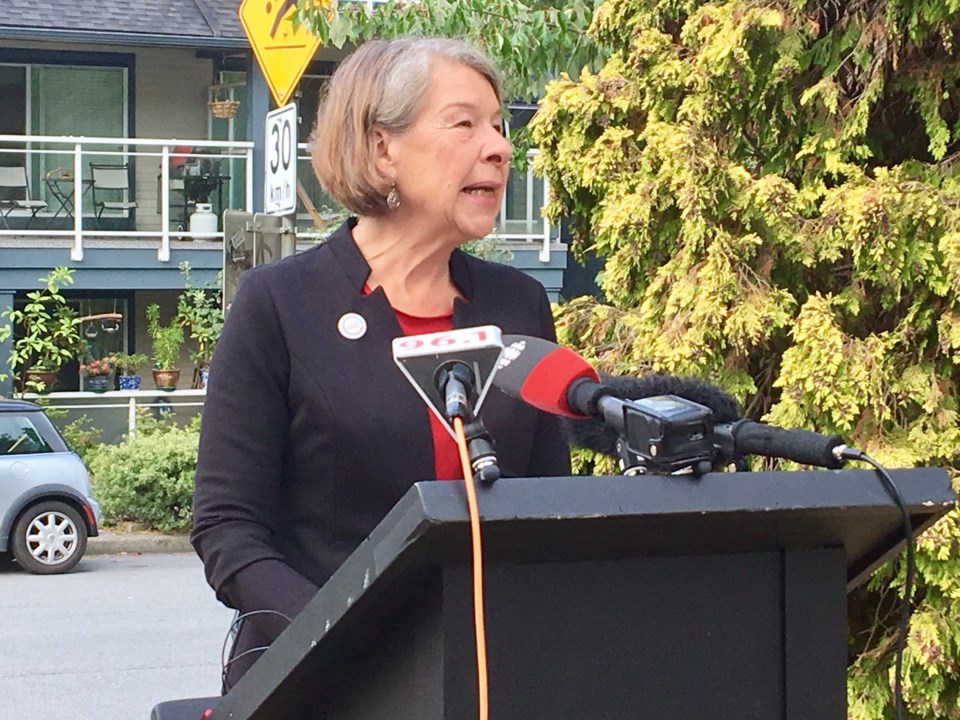Two political parties battling to win a seat on city council in the Oct. 14 byelection have joined the chorus of candidates making affordability a central plank in their platforms.
OneCity and the Green Party held news conferences Tuesday within the space of two hours of each other to release their plans to create affordable housing in Vancouver — an ongoing pursuit of the ruling Vision Vancouver party, which has become the target of candidates in the campaign.
“I was excited when the current council was first elected, I believed that they would do what they said they would do,” said Judy Graves, OneCity’s council candidate, who spoke to reporters at Grandview Park on Commercial Drive. “But in the last eight years, you and I have seen their promises broken. Voters are telling me that the current city council have made life in Vancouver unaffordable.”
Graves’ reference to broken promises relates to Mayor Gregor Robertson not ending “street” homelessness by 2015. She also told stories of how an elderly friend was hit with “gouging” rent increases and is “praying to die before her money runs out.”
She knows a middle-class couple with two children who can afford $2,000 a month for a three-bedroom place but can’t find one. The family is living in a one-bedroom apartment, said Graves, adding that she has other friends sleeping on sidewalks, in parks and alleys every night.
“That is a disaster,” said Graves, who was the city’s homeless advocate before she retired in May 2013.
Graves proposed a luxury property tax of 1.5 per cent on the wealthiest one per cent and 0.5 per cent on the wealthiest five per cent of residential property owners. She also wants all city-owned rental buildings to be rented at 30 per cent of a tenant’s income.
Creating a “flipping levy” to target speculators and opening up all neighbourhoods to inclusionary zoning, an approach that would tie affordable housing to a new development, are other ideas that Graves rolled out Tuesday as part of OneCity’s housing plan.
“I think it’s fair for the people who have benefited most from the current housing bubble to do their fair share in fixing it — and that means the speculators, the developers and the extremely wealthy,” she said, adding that the policies would generate “hundreds of millions of dollars every year.”
Although the party has described the plan as “made-in-Vancouver,” Graves acknowledged creating a luxury property tax and flipping level would require approval of the provincial government. In the coming weeks, OneCity will announce additional measures to protect and advocate for renters and address gentrification in the Downtown Eastside.
Pete Fry, the Green Party’s council candidate, told reporters at a news conference at Canada Place that the party’s housing plan is focused on what can be achieved with existing tools at city hall. He, too, advocated for inclusionary zoning to create affordable housing and tie that type of housing to median local incomes.
Other measures include creating a city tenants’ office to support tenants and prevent “renovictions” and short-term rental conversions, provide incentives to build “truly affordable purpose-built” rental housing and streamline building codes and zoning bylaws to develop more forms of housing, including townhouses and row houses.
“One of the big problems in the city of Vancouver is we have unreasonably long regulation times,” Fry said. “To get a building permit can take upwards of a year-and-a-half, almost two years. It’s the highest in [greater Vancouver]. So we need to resource our staff and expedite these kind of things and move quicker through the red tape and start getting the housing built that we need.”
Fry said the Vancouver Greens would work with their provincial counterparts, which struck an agreement with the ruling NDP government, to create strategies to address speculation on real estate and build more public housing.
If Fry is elected, he will join Green Party Coun. Adriane Carr on the 11-member council. Vision holds the majority while the NPA holds three seats. The byelection is being held because former Vision councillor Geoff Meggs resigned to become chief of staff to Premier John Horgan. Voters will also cast ballots for nine school trustees to replace the board that was fired by the provincial government for not balancing a budget.
Independent candidate Jean Swanson has also focused her campaign on making Vancouver more affordable. She is campaigning for a four-year rent freeze and the construction of more than 2,000 modular housing units — to match the number of homeless people recorded in a homeless count in March — until permanent homes are built.
The NPA’s council candidate, Hector Bremner, and Vision’s candidate, Diego Cardona, who are both renters, have put affordability at the top of their campaign agendas. Mary Jean Dunsdon of Sensible Vancouver is focused on ending cannabis prohibition in Canada.
In March, the city unveiled a multi-faceted housing plan that proposed to create thousands of more rentals, allow for a better mix of homes and develop units that will be tied to a person’s income. Since Vision got elected in 2008, it has approved more than 2,000 laneway homes and 1,000 new rental units each year since 2012. Vision has also worked with the provincial government to open shelters and purchase temporary housing.
The provincial government announced Monday that $208 million will be used to construct 1,700 new units of affordable housing in B.C. An additional $291 million will pay for the construction of 2,000 modular housing units for homeless people. It hasn’t been revealed how many of those units will be built in Vancouver.



